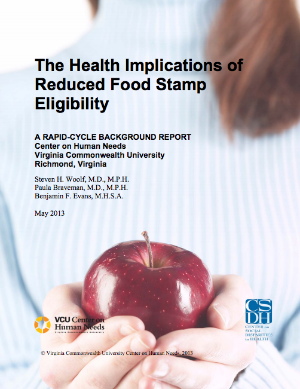In 2012, the 112th Congress submitted two bills for debate (S. 3240 and H.R. 6083) that would cut funding to the Supplemental Nutrition Assistance Program (SNAP, formerly known as the Food Stamp program) by as much as $16.1 billion over ten years. The Health Impact Project, a collaboration of the Robert Wood Johnson Foundation and The Pew Charitable Trusts, conducted a Health Impact Assessment (HIA) of these two bills to help Congress consider the health consequences of weakening the program.
The Pew Charitable Trusts contracted with the Center to summarize published research on the potential impact of a reduction in food stamps and household income on the immediate and long-term health consequences for SNAP recipients, including the long-term consequences to children.
The report reviews this evidence and, using modeling techniques, provides estimates of potential effects on mortality and the cost of diabetes care for the nation, the 50 states, and specific counties if poverty levels increase as a result of the legislation. The Center's report, which found that increased diabetes costs could erase the intended "savings" from reducing SNAP funding, was used in the full HIA report to Congress from The Pew Charitable Trusts (available on the Health Impact Project's website).
